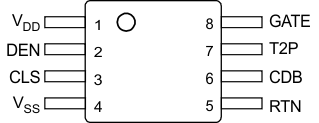SLVSB98A March 2012 – July 2015 TPS2379
PRODUCTION DATA.
- 1 Features
- 2 Applications
- 3 Description
- 4 Revision History
- 5 Pin Configuration and Functions
- 6 Specifications
- 7 Parameter Measurement Information
-
8 Detailed Description
- 8.1 Overview
- 8.2 Functional Block Diagram
- 8.3 Feature Description
- 8.4
Device Functional Modes
- 8.4.1
PoE Overview
- 8.4.1.1 Threshold Voltages
- 8.4.1.2 PoE Start-Up Sequence
- 8.4.1.3 Detection
- 8.4.1.4 Hardware Classification
- 8.4.1.5 Inrush and Start-up
- 8.4.1.6 Maintain Power Signature
- 8.4.1.7 Start-up and Operation
- 8.4.1.8 PD Hotswap Operation
- 8.4.1.9 CDB and T2P
- 8.4.1.10 Auxiliary Pass MOSFET Control
- 8.4.1.11 Using DEN to Disable PoE
- 8.4.1
PoE Overview
- 9 Application and Implementation
- 10Power Supply Recommendations
- 11Layout
- 12Device and Documentation Support
- 13Mechanical, Packaging, and Orderable Information
Package Options
Mechanical Data (Package|Pins)
- DDA|8
Thermal pad, mechanical data (Package|Pins)
- DDA|8
Orderable Information
5 Pin Configuration and Functions
DDA Package
8-Pin HSOP
Top View

Pin Functions
| PIN | I/O | DESCRIPTION | |
|---|---|---|---|
| NAME | NO. | ||
| VDD | 1 | I | Connect to positive PoE input power rail. Bypass with 0.1 µF to VSS. |
| DEN | 2 | I/O | Connect 24.9 kΩ to VDD for detection. Pull to VSS disable pass MOSFET. |
| CLS | 3 | O | Connect resistor from CLS to VSS to program classification current. |
| VSS | 4 | — | Connect to negative power rail derived from PoE source. |
| RTN | 5 | O | Drain of PoE pass MOSFET. |
| CDB | 6 | O | Opendrain converter disable output, active low, referenced to RTN. |
| T2P | 7 | O | Active low indicates type 2 PSE connected. |
| GATE | 8 | O | Auxiliary gate driver output. |
| PowerPAD | — | — | The PowerPAD must be connected to VSS. A large fill area is required to assist in heat dissipation. |